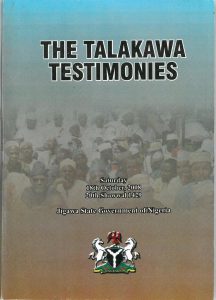By Adagbo Onoja
It is so sad learning about the passage of Prof Haruna Wakili, a Professor of History at Bayero University, Kano. He is the 11th professor to have died in the last two or so months from the university although his is not from COVID-19 complications. Until his death, he was the Deputy Vice-Chancellor, (Administration) in the university. A specialist on the history of social resistance in postcolonial northern Nigeria on which he wrote his PhD thesis, he remained a gentleman. Born in 1960 in Hadejia in Jigawa State, he attended local schools before emerging in Bayero University, Kano where he ended up becoming a lecturer, a testimony to his academic performance.

Assuming office as DVC-Admin sometimes in 2018
In the course of his teaching career, he served as Director of Mambayya House, late Mallam Aminu Kano’s residence which was acquired by the Federal Government and made a part of the Department of Political Science of BUK. He was equally the Jigawa State Commissioner for Education from 2010 to 2015.
In the past five months, he has been in India for medical attention. He came back to Nigeria a week ago but only to be admitted at the National Hospital in Abuja. He didn’t make it.
The news of his death came as a surprise. He had been advertised as a Guest Speaker or a similar position not too long ago by a Kano based NGO and the idea that death could be his fate soon was simply out of mind. So, when the news came, it was very surprising. But the tale bearer was beyond question in such a matter. So, memories of one’s interaction with him began flooding back.
As an ex-student of Bayero University, I had known him since the 1990s but not as closely as it happened in late 2000 when we converged in the service of the Sule Lamido administration in the State. I preceded him in the government. That meant that although, he was the indigene, I was his host as far as Government House was concerned.
For some reasons, he preferred to wait in the Media Adviser’s office each time he came to the Government House, Dutse rather than in the governor’s waiting room. It was on one such occasion that he became an accidental participant in the weekly Government House Media Department Review Session. He was so impressed that he called it a Master’s Degree Seminar. The sessions were to review how well and how badly the department performed in the past week and what needed to be done. But it also stretched to analysis of the mediaspace and the business of communicating power. So, it was both a practicum as well as an academic critique. He took a liking for it.
Typical of many of the scholars in Bayero University, Kano, he too was interested in the ideological direction signposted by the state government, especially in the May 29, 2007 address at Lamido’s swearing-in. At some point, he had done a survey of some sort on popular reaction. At every stage, we talked it over. He was most helpful in transcribing and producing the subsequent booklet on the Talakawa Summit, working with the then Secretary to the State Government, Dr Aminu Taura.

 In 2010, the governor, Alhaji Sule Lamido, decided to formally absorb him into the cabinet as replacement for Prof Ruqayyah Ahmed Rufai who had been absorbed into the Federal cabinet from the position of Education Commissioner. I was away in Ibadan when the governor called to break the news. It was a perfect replacement except that this was going to be a quiet Education Commissioner. Haruna Wakili was usually quiet. It could just be his nature just as it could be a part of the cautiousness by most people who came around not to rub the governor on what they thought could be his wrong side. I was always amazed about that and I always wondered if it was cultural or a matter of deference to protocol.
In 2010, the governor, Alhaji Sule Lamido, decided to formally absorb him into the cabinet as replacement for Prof Ruqayyah Ahmed Rufai who had been absorbed into the Federal cabinet from the position of Education Commissioner. I was away in Ibadan when the governor called to break the news. It was a perfect replacement except that this was going to be a quiet Education Commissioner. Haruna Wakili was usually quiet. It could just be his nature just as it could be a part of the cautiousness by most people who came around not to rub the governor on what they thought could be his wrong side. I was always amazed about that and I always wondered if it was cultural or a matter of deference to protocol.
I left Jigawa State in June 2012 but he seemed to believe that I was the first and last source when it comes to documentation on the governor. Much after I had left, he would call each time he had a task that had to do with information on one theme or the other. As a Historian, he took documentation seriously.
As challenging as it is to keep up with the pace of the social media, it still helps in terms of the notice board role of the media. One could still track even people like the late Prof who did not exhibit himself on the social media. That was how I saw his name in one such function not too long ago. In such cases, the conclusion is that we are all doing fine. Unknown to me, he was already sick by then. One other colleague of his who saw him then speaks about him looking sickly rather than robust. Cancer was eating him up. It was the battle against that which took him to India. Alas, he didn’t survive it.
Shakespeare says in Macbeth that there is no art to find a man’s construction in the face. As much as Shakespeare must be right, the late Prof Haruna Wakili is one person I am sure Shakespeare would grant an exception. When we talk of a gentle soul, he it was the expression is most apt. I never heard him gossip about any other person throughout our time in Government House. He could not have so successfully hidden any traces of Machiavellian tendencies if he had them. He was, indeed, gentle and professorial in name and in practice, living above the little tricks that people play in the name of being smart!
At 60, he has died young. But only God can decide the matter of one’s time and manner of death. We do owe Providence gratitude that he published a lot as a scholar, stretching from social history, democracy and democratization, resistance politics, revolts and rebellion, radical populism and the involvement of clerics in secular partisan politics, etc.



























